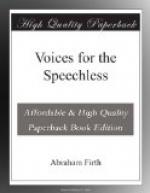have rolled on, has received even here a fulfilment
which in earlier times could not have been dreamed
of. The savage animals have, before the tread
of the Lord of Creation, gradually disappeared.
Those creatures which show capacity for improvement
have been cherished and strengthened and humanized
by their intercourse with man. The wild horse
has been brought under his protecting care, has become
a faithful ministering servant, rejoicing in his master’s
voice, fondled by his master’s children.
The huge elephant has had his “half-reasoning”
powers turned into the faculties of a gentle, benevolent
giant, starting aside from his course to befriend
a little child, listening with the docility of a child
to his driver’s rebuke or exhortation. The
light, airy, volatile bird seems to glow with a new
instinct of affection and of perseverance under the
shelter of the firm hand and eye of man. The dog,
in all Eastern nations, even under the Old Testament
itself, represented as an outcast, the emblem of all
that was unclean and shameful, has, through the Gentile
Western nations, been admitted within the pale of human
fellowship. Truly, if man has thus, as it were,
infused a soul into the dumb, lawless animals, what
a community of feeling, what tenderness should it require
from him in dealing with them. What a heartless,
in one word, what an
inhuman spirit is implied
by any cruelty towards those, his dependents, his followers,
his grateful, innocent companions, placed under his
charge by Him who is at once their Father and ours.
Remember our common origin and our common infirmities.
Remember that we are bound to feel for their hunger,
their thirst, their pains, which they share with us,
and which we, the controllers of their destiny, ought
to alleviate by the means which our advancing civilization
enables us to use for ourselves. Remember how
completely each of us is a god to them, and, as a god,
bound to them by godlike duties.
Dean Stanley.
* * * *
*
Justice to the brute creation.
The rights of all creatures are to be respected, but
especially of those kinds which man domesticates and
subsidizes for his peculiar use. Their nearer
contact with the human world creates a claim on our
loving-kindness beyond what is due to more foreign
and untamed tribes. Respect that claim.
“The righteous man,” says the proverb,
“regardeth the life of his beast.”
Note that word “righteous.” The proverb
does not say the merciful man, but the righteous,
the just. Not mercy only, but justice, is due
to the brute. Your horse, your ox, your kine,
your dog, are not mere chattels, but sentient souls.
They are not your own so proper as to make your will
the true and only measure of their lot. Beware
of contravening their nature’s law, of taxing
unduly their nature’s strength. Their powers
and gifts are a sacred trust. The gift of the
horse is his fleetness, but when that gift is strained
to excess and put to wager for exorbitant tasks, murderous
injustice is done to the beast. They have their
rights, which every right-minded owner will respect.
We owe them return for the service they yield, all
needful comfort, kind usage, rest in old age, and an
easy death.




